|
SREC Update - Third Quarterly Meeting The third quarterly meeting of the State Republican Executive Committee was held on October 1st in Austin, TX. The meeting was preceded by meetings of SREC committees on September 30th. The committees that met on September 30th were:
On the evening of September 30th, the Volunteerism Committee hosted the Volunteer of the Year Gala and Awards ceremony. The dinner was held at the Austin Club, and featured a keynote address by Lt. Governor David Dewhurst, who also presented gavels to each of the Volunteers of the Year. Attorney General Greg Abbott also attended and presented awards to our honorees. A full, separate report of the VOY dinner will be provided in the near future.
The first major item on the agenda was the consideration of a proposed rules change, relative to how the delegates and alternates to the Republican National Convention are selected. The existing rule allocated delegates by Congressional District, utilizing a modified "winner-take-all" system. Under this previous process, any candidate who received over 50% of the vote in a Congressional district received 100% of the delegates from that Congressional district. If the top candidate received less than 50%, they would receive two delegates, and the second place finisher would receive one delegate, provided the second place finisher received at least 20% of the votes in that district. This rule potentially conflicted with the new Republican National Committee rule adopted in August of 2010, which required states that held primaries prior to April 1 to select their delegates proportionally. Consequently, several months ago, Chairman Steve Munisteri accepted Rules Committeeman Clint Moore's offer to draft a proposed new and compliant rule. After seven drafts and input from around the state, a final version was proposed and introduced at the State Republican Executive Committee meeting on October 1st. SREC member Josh Flynn moved that Clint Moore's final draft of the proposed rule change be adopted. The rule passed unanimously. Under the new rule, presidential candidates will be allocated national convention delegates in direct proportion to the statewide popular vote they receive in the Texas Republican Primary on March 6, 2012. However, to ensure that local leadership continues to have significant input in the selection of delegates, 3 delegates per Congressional district will still be selected. With 36 Congressional districts, this means that 108 of the state's 155 delegates will be selected by individual Congressional districts. 3 delegate spots are reserved for the National Committeeman, National Committeewoman and State Chairman, pursuant to national party rules. The remaining 44 delegates will be selected at-large by a nominating committee at the convention. The proposed rule has a mathematical formula by which individual delegates are assigned to a particular candidate. The top vote getter will be allocated delegates first from Congressional districts in which they received the highest percentage of the vote, until their delegate allotment is fulfilled. The second highest place vote getter will be allocated delegates from Congressional districts that they did the best in, whose districts still have non-allocated delegates. This process will then continue with all the candidates until all of the Congressional district delegates are allocated. Once all the Congressional district delegates are allocated, at-large delegates will be allocated to ensure complete proportionality.
After Commissioner Smitherman spoke, the SREC heard from the officers of the party. Chairman Munisteri in his report, went over the party's finances. He reported that the party's cash balance was significantly better at the end of the summer than he had projected would be the case at the last meeting. It was anticipated that the cash balance of the party would fall from around the $800,000 level to the $500,000 level over the summer months as a result of historical drop-off of mail and telephone contributions during the summer and the inability to hold fundraisers during the summer because of vacation conflicts of large donors. The Chairman reported that we came out of the summer with around $700,000 in un-dedicated cash and approximately $750,000 in total cash. However, he noted concern that since the end of the summer, mail contributions have been less than projected and as a result, usable cash had dropped to approximately $626,000 and overall cash to about $700,000. He and the staff believe that this drop-off is due to several factors. First, the Presidential election campaign is causing increased competition for contributors. Second, the Republican National Committee has been sending out voluminous mailings into Texas - some of which confuse contributors into thinking that the money is going in to Texas. Also, the RNC held two fundraisers in Texas - one in Houston and one in Dallas - which solicited donations from large donors, some of whom are Texas GOP contributors. The Chairman noted that the Texas GOP receives none of this money and that in fact, the Texas GOP has received zero dollars from the RNC during 2011.
The Chairman also espoused his belief that the Grassroots Club was the long-term solution to the party's structural fundraising problems. He was excited to announce that the party had reached its goal of 1,000 Grassroots Club members during the first year of the program. The 1,000 members will pay for approximately one month of overhead at RPT. Therefore, the program's eventual goal is for the Grassroots Club to provide for all of the base overhead of the party. To accomplish this, the party has set a goal of increasing the net signups by 1,000 per year. To reach this goal, the party is employing a number of strategies, including a pilot program to communicate with primary voters and ask them to join the Grassroots Club. The Chairman reported that all bills are still paid to zero every two weeks, and that as of September 30, 2011, the party had no debt whatsoever.
Vice-Chairwoman Melinda Fredricks among other topics, talked about her new role as Chair of the Grassroots Club Committee and outlined some of the plans of the Committee. These include signing up the remaining SREC members and providing incentives for people to join. She also spoke about the party's need to continue working with and among the Hispanic communities in Texas so that our shared values can continue to grow in influence in our government.
As a bit of background on this topic - in previous years, some Republicans have wanted the state party to prepare a legislative report on the individual voting records of elected officials. This topic came up during the terms of two previous State Chairman - Susan Weddington and Tina Benkiser. During Susan Weddington's tenure, the State Convention Rules Committee ruled that such a report would violate the bylaws of the state party. The bylaws in Article IX, Section 3 say "No Party funds or resources shall be used, either directly or indirectly, to influence intraparty contests." Subsequently, in August of 2009 - the issue was brought before the SREC during Tina Benkiser's chairmanship. At that time, the SREC voted that a legislative report card would violate this Article 9 provision of the bylaws. Chairman Benkiser's legal opinion also was that such a report would violate the bylaws. The reason why publishing a legislative report would violate the bylaws is because presumably, the reports could easily be used to attack a primary candidate or promote a primary candidate, and/or indicate an official stamp of disapproval or approval of a candidate. Since the bylaw uses the word "indirectly", the bylaw provision is broad enough to include a legislative report. At the 2010 State Convention, the Platform Chairman, Representative Wayne Christian, brought the matter up in the Platform committee. The current SREC Rules Chairman Dan Pickens, who favors disclosure of legislator voting records, advised Representative Christian that the platform was not the appropriate method to change the rules of the party. However, despite this advice, Representative Christian decided to move forward with the plank anyway. In the Spring of 2011, Chairman Munisteri and Executive Director Jesse Lewis met with Representative Christian in the RPT offices, at which time they told Representative Christian that the platform plank violated the bylaws, and that to enact the platform plank would first require a change to the bylaws. The Chairman also informed Representative Christian that another problem with the platform plank was that it assigned the task to the previous Chairman of the Platform Committee, when in reality, that position no longer existed. The Chair informed Representative Christian that the rules of the Republican Party of Texas state that chairmanships from a convention expire at the end of the convention. The Chairman also informed Representative Christian, that in order to give this issue a complete and fair hearing, he would receive any report that Representative Christian wished to forward to him. Also, the Chair would appoint a committee to study all aspects of the issue. Following this meeting, Chairman Munisteri then sent written communication to all SREC members that he was proposing to receive any such report in that fashion and also covered the topic in a teleconference call with party leadership. There were no objections voiced at that time to the Chairman proceeding in this fashion. Thus, when Representative Christian asked several members of the Young Conservatives of Texas to prepare a legislative report on Texas House and State Senate votes, and sent this report to Chairman Munisteri - the Chairman referred it to an RPT committee of the legal counsel, assistant legal counsel, parliamentarian, and two SREC members (one who has been opposed to a legislative report, and one who has been in favor of a legislative report.) At the SREC meeting, Patrick O'Daniel's report informed members that the committee unanimously ruled that the legislative report which was submitted by Representative Christian did not comply with all criteria of the platform plank. Further, O'Daniel's report recommended that the advisory group be turned into an official ad hoc committee of the SREC to study all aspects of the issue and make further report at the next meeting. The additional aspects of the issue that need to be addressed are whether or not the bylaws should be changed, how the platform planks, rules of the party, and bylaws should function together, and the different options available to the SREC relative to this issue. After Patrick O'Daniel's report, the Chairman said he would entertain motions pertaining to the acceptance or rejection of the report. Prior to entertaining motions, the Chairman took the extraordinary step of asking the SREC if they would like, without objection, to spend a few minutes to hear the Chairman explain what was going on and the different options the SREC had relative to accepting or rejecting the report. Without objection, the Chairman went off the agenda and noted that under two previous chairmanships, and by a previous vote of the SREC - a legislative report such as one submitted by Representative Christian would violate the bylaws. He further explained that, because he (as a former practicing attorney), the Parliamentarian, and other attorneys he had consulted with, all are in agreement that such a report would violate the bylaws - that in the event that somebody raised a point of order objecting to any motions to publish a legislative report, he would have no alternative but to sustain such a point of order. He also noted, that apparently what was attempting to be done was to use a platform plank to change a bylaw - something which cannot legally be done. The Chairman noted that platform planks are statements of principles and the bylaws are the legal rules under which an organization is to operate. He further stated that bylaws can be amended, the body simply needs to go through the procedure delineated in the bylaws. The Chairman indicated that if the SREC wished to accept the committee report, he would also ask the committee to consider a proposal that the Chair favors, and which he has proposed in the hopes of having a solution that would satisfy if not all, at least the vast majority of party leadership. The Chair's proposal is for the committee to study the option of providing a detailed description of all legislative votes, and making these records easily accessible to party leadership. The Chair noted that his proposal has a dual advantage of providing information to primary voters as to how individual elected officials voted, thus fulfilling one of the chief goals of those who favor a legislative report. At the same time, the proposal does not allow such a report to be manipulated by utilizing only selected votes and adds the advantage of avoiding divisiveness and arguments over which votes should be used and which votes should not be used. The Chair reported that he had already obtained a bid from a vendor that had catalogued every vote from the Texas House with a description, and that the vendor could make this service available for a fee of $10,000. The Chairman offered to personally donate $10,000 to the party to cover this cost if this was the will of the body and it would bring the two sides together. Finally, the Chairman also noted that there could only be a debate if there was a motion on the table, and since any motion to publish a legislative report would have to be ruled out of order, that this may preclude any debate on the issue. Therefore, to be fair to all sides, the Chairman again proposed the SREC go off agenda and if there was no objection, that he would allow an open mike where any SREC member could speak on the pros and cons of the issue. There was no objection, and a lengthy debate then followed on the pros and cons of issuing a legislative report. The people in favor of a legislative report put forth the argument that one should be issued because delegates at the convention voted for a platform that included a plank calling for such a report, that they want accountability of their elected officials, and that it would be a helpful tool in defeating candidates that did not uphold the Republican platform. The opponents of a legislative report agreed that legislators should be held accountable for their votes, but believed a better way to do this is to provide access to the actual voting records of legislators. They believed that once you start selecting specific votes, that process would be subject to abuse and personal agendas, that there would be divisiveness and disharmony over what votes to use and which not to use, and that to allow legislative reports would in effect, inject the state party organization into primaries. They felt that this created potential problems such as the state party in Austin dictating to other parts of the state as to which candidates to vote for, etc. Opponents also noted that there were already many organizations that already prepare ratings, such as Eagle Forum, EmpowerTexans and Young Conservatives of Texas - so that conservative/liberal ratings and information on candidates is already readily accessible. Opponents also argued that delegates were not informed that the plank violated the party's bylaws. It was further pointed out that the report submitted by Representative Christian did not actually comply with the platform. The platform calls for a legislative report to be prepared in rough draft form by the Platform Committee chair and for a final report to be jointly prepared with the State Chairman and SREC. Opponents noted that the report was not prepared by Representative Christian, rather it was prepared (as noted by Christian's emails) by members of the Young Conservatives of Texas, not in conjunction with the SREC or the State Chair. They also noted that it did not cover all elected officials as the platform plank requires, and that only a small portion of the platform issues were actually covered. Opponents believe at the very least, any Republican Party of Texas document should actually be generated by the party itself, and not an unaffiliated, non-auxiliary group. After all wishing to speak had their say, the Chairman then entertained motions. There was a motion to accept the recommendation of the legal counsel. The motion was defeated 29-26. Immediately following was a motion to reconsider, which requires a two-thirds vote. The motion to reconsider passed 35-17. There was then a second vote on the motion to accept the committee report, and on the second time around, the motion passed. The end result is that there is now an official ad hoc committee to the SREC, chaired by the legal counsel and consisting of himself, the assistant legal counsel, parliamentarian and two SREC members which will report back at the December 2nd SREC meeting. The actual language of the motion that passed is as follows: "Recommend a special ad hoc committee be authorized make a report to the Rules Committee on whether the relevant platform plank conflicts with the bylaws or other rules of the Republican Party of Texas and to make recommendations with respect to this matter." There was also a motion made by Bonnie Lugo and Weston Martinez to have the Republican Party of Texas place a link to the actual voting records of state and federal elected officials on the official party website. The Chairman ruled that this motion was in order, since it wasn't in the form of a legislative report or scorecard, and did not pick out selected votes. He further reasoned that this was simply a link to an already existing governmental website, and therefore he would allow a vote on the motion. The motion passed, and now every Republican has an easy access to check the voting records of their elected officials by going to this link. Following this motion, SREC member David Halvorson inquired of the chair, as to the proper notice to propose amending the bylaws to allow for a legislative report at the next SREC meeting. The Chairman informed Mr. Halvorson that if he would distribute a copy of his proposed bylaws change to all members of the SREC, he would commit to putting the proposed bylaws change on the call. After confirming that every SREC member had received a copy of the proposed bylaws change, the Chairman committed to having a vote on the bylaws change at the next SREC meeting. Chairman Munisteri is willing to answer any questions that anyone has regarding this issue. If you have a question, please call 512-477-9821 and ask for the Chairman.
Near the end of the afternoon, former Dallas County Chairman Nate Crain addressed the SREC to announce a project that he has developed and funded to help the RPT promote the Grassroots Club, and other avenues of outreach in Texas. Nate introduced Michael Turk, formerly of the RNC, who made a brief presentation to the SREC to talk about the new online venture known as "gamification" - an online system of rewards and user signups which will launch this fall on the RPT website. Prior to adjourning, several RPT auxiliaries and coalitions made full reports about their activities and future plans for winning the battle in 2012. There is a wave of excitement and anticipation in the air as grassroots Texas Republicans are ready to enter this historic election year as part of a determined coalition with boots on the ground! The next quarterly meeting of the State Republican Executive Committee will be held in Austin, Texas at RPT Headquarters on Saturday, December 2, 2011. |
|
|
    |

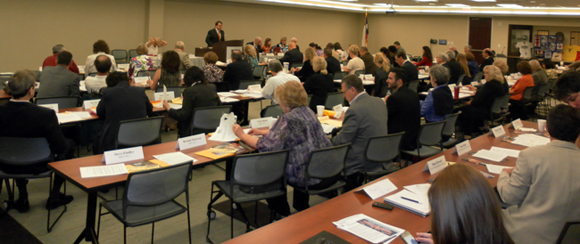
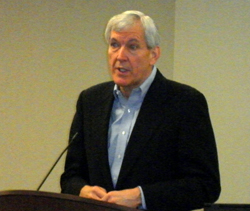 Prior to
the SREC meeting, our Chaplain Rex Johnson hosted a prayer
service featuring a guitarist from his church. Also prior to the official start
of the meeting, former Railroad Commissioner Michael Williams
provided breakfast for SREC members. After the invocation, pledges, and singing
of the National Anthem, the meeting was kicked off with an address by the SREC
event co-sponsor, former Dallas Mayor Tom Leppert. Leppert
spoke about the need to be honest with this generation and future generations
about the financial situation of our country. As a businessman, he recognizes
that the total debt obligations of our country are crippling to our future. He
spoke straightforwardly about the need to repeal Obamacare and more importantly
to follow up with the question "what do we do then?" Mayor Leppert believes that
prevention, competition and health savings accounts are the keys to promoting a
reasonable and workable solution to our country's long-term healthcare
needs.
Prior to
the SREC meeting, our Chaplain Rex Johnson hosted a prayer
service featuring a guitarist from his church. Also prior to the official start
of the meeting, former Railroad Commissioner Michael Williams
provided breakfast for SREC members. After the invocation, pledges, and singing
of the National Anthem, the meeting was kicked off with an address by the SREC
event co-sponsor, former Dallas Mayor Tom Leppert. Leppert
spoke about the need to be honest with this generation and future generations
about the financial situation of our country. As a businessman, he recognizes
that the total debt obligations of our country are crippling to our future. He
spoke straightforwardly about the need to repeal Obamacare and more importantly
to follow up with the question "what do we do then?" Mayor Leppert believes that
prevention, competition and health savings accounts are the keys to promoting a
reasonable and workable solution to our country's long-term healthcare
needs.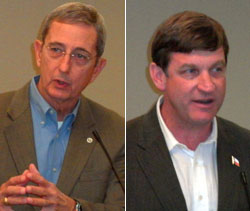 After the
new delegate rule was adopted, the SREC heard from Texas Land Commissioner
Jerry Patterson, who spoke about the runaway regulations and
over-reach of the EPA and how it is affecting Texas businesses. Following
Commissioner Patterson, the SREC heard from representatives of the Associated
Republicans of Texas (ART). George Seay, a grandson of former
Texas Governor Bill Clements, provided a detailed list of the
priorities and projects that ART is working on and also introduced the ART
staff. Associated Republicans of Texas is an independent group of Republicans
who raised several million dollars to support Republican nominees last election
cycle. During the last election cycle, the RPT opened lines of communications
with the ART in order to facilitate cooperation whenever that was mutually
beneficial to both groups.
After the
new delegate rule was adopted, the SREC heard from Texas Land Commissioner
Jerry Patterson, who spoke about the runaway regulations and
over-reach of the EPA and how it is affecting Texas businesses. Following
Commissioner Patterson, the SREC heard from representatives of the Associated
Republicans of Texas (ART). George Seay, a grandson of former
Texas Governor Bill Clements, provided a detailed list of the
priorities and projects that ART is working on and also introduced the ART
staff. Associated Republicans of Texas is an independent group of Republicans
who raised several million dollars to support Republican nominees last election
cycle. During the last election cycle, the RPT opened lines of communications
with the ART in order to facilitate cooperation whenever that was mutually
beneficial to both groups.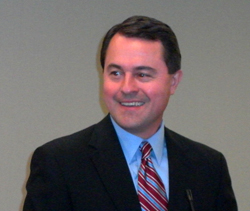 The
lunchtime speaker was Agriculture Commissioner Todd Staples,
who also was an SREC event co-sponsor. Commissioner Staples talked about the
need for border security and presented a detailed recap on the current situation
–
The
lunchtime speaker was Agriculture Commissioner Todd Staples,
who also was an SREC event co-sponsor. Commissioner Staples talked about the
need for border security and presented a detailed recap on the current situation
– 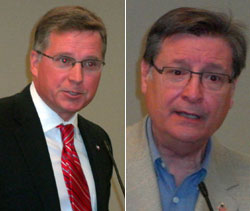 The SREC
also heard from newly appointed Railroad Commissioner Barry
Smitherman, who was appointed by Governor Perry to fill the remainder
of the term left vacant by Michael Williams. Commissioner Smitherman introduced
himself to the SREC and thanked them for their service. He announced that he has
already been hard at work representing Texas on a number of issues on policy and
energy independence for Texas. Smitherman talked at length about the great need
to enact regulatory reform to promote predictability, transparency,
accountability and punishing bad actors. He believes that through these efforts,
Texas will continue to create and grow jobs.
The SREC
also heard from newly appointed Railroad Commissioner Barry
Smitherman, who was appointed by Governor Perry to fill the remainder
of the term left vacant by Michael Williams. Commissioner Smitherman introduced
himself to the SREC and thanked them for their service. He announced that he has
already been hard at work representing Texas on a number of issues on policy and
energy independence for Texas. Smitherman talked at length about the great need
to enact regulatory reform to promote predictability, transparency,
accountability and punishing bad actors. He believes that through these efforts,
Texas will continue to create and grow jobs. The Chairman
announced that in order to counter the confusion among contributors as to where
their money is going, a new fundraising program was begun, titled "Raised in
Texas, Stays in Texas". This program was kicked off by a letter to some 60,000
Republican contributors from Texas, educating them to the fact that the RNC
solicitations and solicitations from other national Republican groups, do not
yield any financial benefit to the Texas GOP. If donors wish for their money to
be spent in Texas on Texas Republicans - they need to look for the "Raised in
Texas, Stays in Texas" brand which will now be on every Texas GOP
fundraiser.
The Chairman
announced that in order to counter the confusion among contributors as to where
their money is going, a new fundraising program was begun, titled "Raised in
Texas, Stays in Texas". This program was kicked off by a letter to some 60,000
Republican contributors from Texas, educating them to the fact that the RNC
solicitations and solicitations from other national Republican groups, do not
yield any financial benefit to the Texas GOP. If donors wish for their money to
be spent in Texas on Texas Republicans - they need to look for the "Raised in
Texas, Stays in Texas" brand which will now be on every Texas GOP
fundraiser.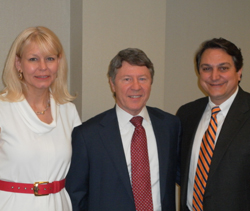 After
reporting on the party's finances, the Chairman outlined preliminary plans that
had already been drafted for the Victory 2012 effort. He then surprised the SREC
by introducing the newly appointed statewide Chairman of Victory 2012, Harris
County Judge Ed Emmett. Judge Emmett then addressed the group
and indicated that in the coming months, he will be working closely with RPT
leadership and staff to develop specific plans for Victory 2012, and looks
forward to receiving input from SREC members and local county leadership.
After
reporting on the party's finances, the Chairman outlined preliminary plans that
had already been drafted for the Victory 2012 effort. He then surprised the SREC
by introducing the newly appointed statewide Chairman of Victory 2012, Harris
County Judge Ed Emmett. Judge Emmett then addressed the group
and indicated that in the coming months, he will be working closely with RPT
leadership and staff to develop specific plans for Victory 2012, and looks
forward to receiving input from SREC members and local county leadership.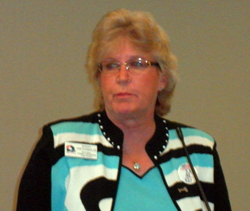 National
Committeewoman Borah Van Dormolen gave an update on her
activities and announced that she is making selections for the "Women Working
For Change" convention this November in Washington DC. Borah also announced the
RNC internship program for 2012, and encouraged Republican college students to
apply for these limited opportunities. For more information, please contact the
RPT offices - packets can be sent electronically. She also announced the
upcoming Western States Republican Leadership Conference in Las Vegas, NV in and
the Southern Region Leadership Conference in January, 2012 in South
Carolina.
National
Committeewoman Borah Van Dormolen gave an update on her
activities and announced that she is making selections for the "Women Working
For Change" convention this November in Washington DC. Borah also announced the
RNC internship program for 2012, and encouraged Republican college students to
apply for these limited opportunities. For more information, please contact the
RPT offices - packets can be sent electronically. She also announced the
upcoming Western States Republican Leadership Conference in Las Vegas, NV in and
the Southern Region Leadership Conference in January, 2012 in South
Carolina.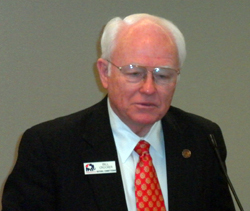 National
Committeeman Bill Crocker spoke about redistricting and
provided a brief update about the current status of the ongoing court cases in
San Antonio and Washington D.C. Bill thanked the SREC for having passed the
change to the RPT rules in order to protect the full delegate strength of Texas
to the national convention in 2012. Finally, Bill spoke about the "broken
system" that is currently in place to influence the Presidential nomination in
early primary and caucus states that are not representative of national
sentiment. He announced that he will work diligently to keep the RNC to its
promise of holding other states accountable for violating RNC rules on early
primary dates by the loss of delegates and other announced consequences,
especially given the great lengths that Texas has gone through to comply with
the RNC rules.
National
Committeeman Bill Crocker spoke about redistricting and
provided a brief update about the current status of the ongoing court cases in
San Antonio and Washington D.C. Bill thanked the SREC for having passed the
change to the RPT rules in order to protect the full delegate strength of Texas
to the national convention in 2012. Finally, Bill spoke about the "broken
system" that is currently in place to influence the Presidential nomination in
early primary and caucus states that are not representative of national
sentiment. He announced that he will work diligently to keep the RNC to its
promise of holding other states accountable for violating RNC rules on early
primary dates by the loss of delegates and other announced consequences,
especially given the great lengths that Texas has gone through to comply with
the RNC rules.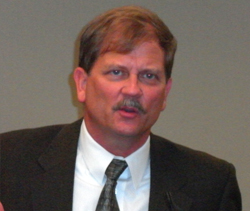 The
Treasurer's report was given by Tom Mechler and Assistant
Treasurer Tom Washington. Tom Mechler reported that all FEC
reporting and TEC reporting was current and accurate. He also noted that the
state party has not needed to go back and amend a single report during 2011,
which is a significant achievement when you consider that virtually all other
major states usually have to file several amended reports during the course of
the year, as has been the case with Texas in the past as well. Treasurer Mechler
reported the party continues to pay all of its obligations and continues to
maintain healthy cash balances.
The
Treasurer's report was given by Tom Mechler and Assistant
Treasurer Tom Washington. Tom Mechler reported that all FEC
reporting and TEC reporting was current and accurate. He also noted that the
state party has not needed to go back and amend a single report during 2011,
which is a significant achievement when you consider that virtually all other
major states usually have to file several amended reports during the course of
the year, as has been the case with Texas in the past as well. Treasurer Mechler
reported the party continues to pay all of its obligations and continues to
maintain healthy cash balances. The SREC
then heard a report from legal counsel Patrick O'Daniel, who
was tasked with overseeing an advisory group to make a recommendation regarding
the issue of legislative reports. In September, Chairman Munisteri had tasked
Patrick O'Daniel and his group with making a recommendation as to what action,
if any, should be taken in response to State Representative Wayne Christian's
forwarding to the Chairman, a legislative report card prepared by members of the
Young Conservatives of Texas.
The SREC
then heard a report from legal counsel Patrick O'Daniel, who
was tasked with overseeing an advisory group to make a recommendation regarding
the issue of legislative reports. In September, Chairman Munisteri had tasked
Patrick O'Daniel and his group with making a recommendation as to what action,
if any, should be taken in response to State Representative Wayne Christian's
forwarding to the Chairman, a legislative report card prepared by members of the
Young Conservatives of Texas.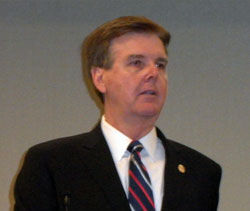 After this
issue was resolved, the SREC then heard from State Senator Dan Patrick, who
urged the body to consider and support a resolution that calls on the Republican
State Senators that if a vacancy occurs in the office of either Lieutenant
Governor or Governor as a result of the 2012 elections, that the caucus
will choose the next Governor and/or Lieutenant Governor in the Republican
caucus, to ensure that the interim replacement will be a Republican. This
resolution was later passed by the full body. An additional resolution
re-affirming the United States' relationship with Israel was also passed by the
full body.
After this
issue was resolved, the SREC then heard from State Senator Dan Patrick, who
urged the body to consider and support a resolution that calls on the Republican
State Senators that if a vacancy occurs in the office of either Lieutenant
Governor or Governor as a result of the 2012 elections, that the caucus
will choose the next Governor and/or Lieutenant Governor in the Republican
caucus, to ensure that the interim replacement will be a Republican. This
resolution was later passed by the full body. An additional resolution
re-affirming the United States' relationship with Israel was also passed by the
full body.